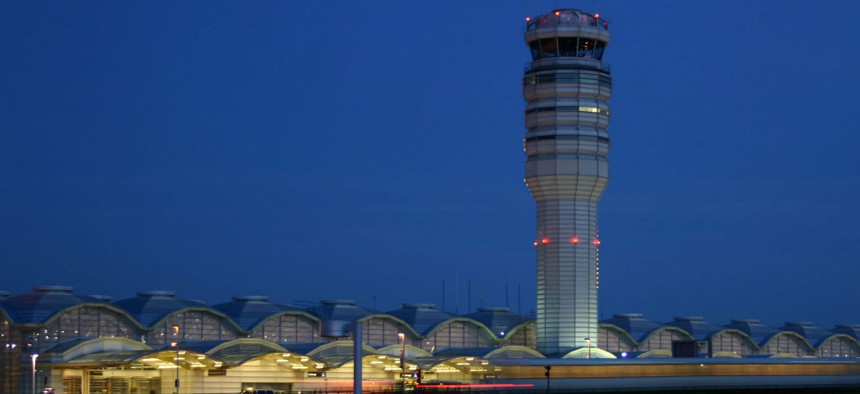House Panel Advances Air Traffic Control Privatization Plan
Controllers union announces formal support for the proposal.
The Trump administration’s plan to privatize the nation’s air traffic control system moved forward in the House Transportation and Infrastructure Committee Tuesday, despite concerted opposition from Democratic members of Congress.
The committee approved the 21st Century Aviation Innovation, Reform and Reauthorization Act (H.R. 2997) 32-25, with all Democrats present voting in opposition. The measure reauthorizes the Federal Aviation Administration, and it transfers the agency’s air traffic control operations to a private nonprofit corporation.
The Trump administration held a signing ceremony for the principles it wished to see in a privatization bill earlier this month.
Under the House proposal, introduced by Transportation Chairman Bill Schuster, R-Pa., the corporation would be governed by a board of directors made up of representatives from airlines, employee unions, and general aviation and airport trade groups.
The nation’s 30,000 air traffic control employees would shift to the new nonprofit entity, and their existing collective bargaining agreements would be honored. Instead of taxes funding the organization, the corporation would establish a user fee on passengers on a per-plane basis.
The National Air Traffic Controllers Association formalized its support for the legislation once it was officially introduced last week.
“After extremely careful review, consideration and deliberation, we have decided to support the bill because it fully aligns with NATCA’s policies, practices and core principles,” said President Paul Rinaldi in a statement. “We made sure that we clearly understood how this bill would protect the National Airspace System and allow it to continue to grow, as well as how it would protect the men and women who are the backbone of the system. This bill protects our workforce – including pay, benefits, retirement and collective bargaining rights.”
But unions representing other sectors of the FAA workforce remained opposed to privatizing air traffic control operations.
“This legislation is simply a bad idea,” said Randy Erwin, president of the National Federation of Federal Employees. “It trades safety for airline profits. There is no other reason to privatize the air traffic control system.”
During the Tuesday markup session, Rep. Peter DeFazio, D-Ore., the top Democrat on the committee, proposed an amendment that would replace the language of the bill with his own counterproposal, introduced in the House earlier this month.
“If this was five, 10 or maybe even seven years ago, I’d say, ‘Yeah, let’s roll the dice, FAA is pathetic at procurement,’” DeFazio said. “But then-Administrator [Randy] Babbitt, when it seemed like we couldn’t make [En Route Automation Modernization] work, he had a radical idea: let’s get the engineers and the controllers in one room. And ERAM today works and it is a fabulous system.”
Schuster, however, said DeFazio’s proposal, which removes the FAA’s funding from the appropriations process—and thereby from threats of government shutdowns—and orders personnel and acquisition reform efforts, is a rehash of failed agency reform efforts.
“This would simply result in FAA’s failed bureaucracy gaining more power and less accountability, which would make for a bigger problem I believe,” Schuster said. “We tried this in 1995 and it didn’t work. Billions of dollars have been spent to get very, very little for our money when it comes to new technology.”
DeFazio’s amendment, as well as a number of other changes to the bill that would have increased government oversight, added consumer advocates to the nonprofit corporation’s governing board, and made it harder for the corporation to sell air traffic control system equipment and other assets after the transition, all failed along mostly party lines.
One Democratic amendment, proposed by Rep. John Garamendi, D-Calif., saw a more welcome reception. Following what Garamendi described as an “unclear” response from Transportation Secretary Elaine Chao on the question of whether the ATC nonprofit corporation would receive any FAA funding when it is established, he sought language preventing any money from the Airport and Airway Trust Fund from being transferred to the new entity.
“It seems to me that in addition to all of the other assets the corporation will receive in this privatization, that this $6.7 billion that’s currently in the trust fund—and that’s cash—should not be transferred,” Garamendi said. “We should not ask the travelling public to provide the cash to get this organization started.”
Schuster agreed, noting: “We share the belief that the new corporation should not receive a dime of money from the trust fund. This is an outstanding amendment that clarifies our intention that this entity be completely separate from government.”
And while Republicans opposed an amendment proposed by Rep. Eddie Bernice Johnson, D-Texas, that would require FAA and independent audits about the value of the assets—including equipment, property and any liabilities—that would be transferred to the new corporation as part of the ATC privatization, Rep. Sam Graves, R-Mo., said he and Schuster were committed to working with Johnson on including the proposal in some form.
A vote on the House floor has not yet been scheduled.




